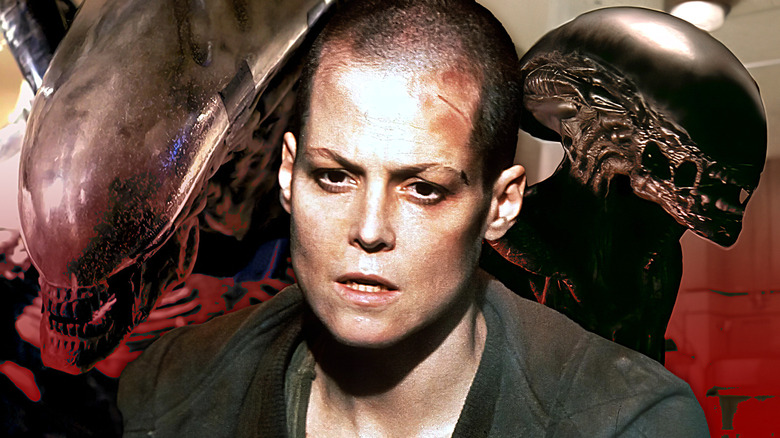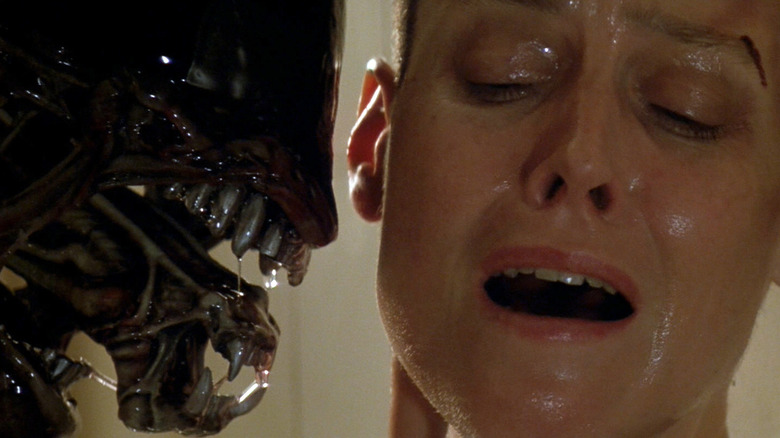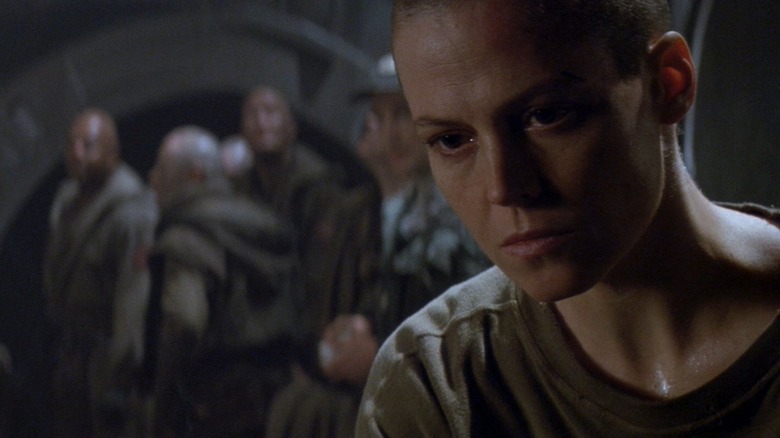What Went Wrong With David Fincher's Alien 3, According To Sigourney Weaver
"Alien 3" is one of the more controversial "Alien" movies. For one thing, the development of the project went through fits and starts. For another, David Fincher, who made his feature directorial debut on the sequel, had notorious behind-the-scenes problems and has more or less disowned the movie entirely. And then there's the fact that the film is unapologetically bleak, including an opening that kills off fan-favorite characters like space Marine Hicks and precocious child Newt. Just to seal the deal, the movie then ends by killing off Sigourney Weaver's Ripley, who was the franchise's main character.
All that said, the film still has its fans (I personally think it's pretty good, all things considered). But even when you take into account the fact that "Alien 3" has its supporters, it's not unfair to say the film is flawed and not held in as high regard as Ridley Scott's original "Alien" or James Cameron's blockbuster sequel "Aliens." The reviews of "Alien 3" were mixed, and the box office wasn't what studio 20th Century Fox had hoped for.
So what went wrong? In a new interview, star Sigourney Weaver has weighed in on the troubled project while also affirming that she doesn't think it's a bad film. "I heard recently that David [Fincher] has disowned the project and I'm sorry about that because I loved working with him, and I think we made a good film," Weaver told Deadline. "I'm glad he got a chance to do his version. It was a great ensemble." Still, Weaver acknowledges that there were definitely behind-the-scenes problems. But before we get to them, we have to look at how "Alien 3" came to be.
The road to Alien 3
After "Aliens" was a hit, Fox was eager to make "Alien 3" happen. For reference, "Aliens" ends with survivors Ripley, Hicks (Michael Biehn), and Newt (Carrie Henn), along with the badly damaged android Bishop (Lance Henriksen), entering hypersleep aboard the spaceship the Sulaco as the ship heads towards Earth. With this in mind, producers David Giler, Walter Hill, and Gordon Carroll got to work on a concept for the next entry in the story. Their proposed third film would keep Ripley mostly in a coma while elevating Hicks to the main character. The producers turned to sci-fi writer William Gibson to pen the script, which further delved into how the evil corporation Weyland–Yutani wanted to turn those pesky Xenomorphs into biological weapons. The plan was for director Renny Harlin to helm the project. But Gibson's script was ultimately deemed unsatisfactory by the producers, and the writer declined to tackle rewrites. Eventually, Gibson's script would be adapted into both a novel and an Audible audiobook production.
After the Gibson script was nixed, Harlin suggested bringing in "The Hitcher" screenwriter Eric Red. Red's screenplay focused on entirely new characters battling aliens on an Earth-like planet. Once again, the producers were unhappy with the material and the script was dropped. The next writer to take a stab at the project was David Twohy, who would go on to write the "Riddick" movies. Twohy's story was set on a prison planet, but Harlin wasn't a fan of the material and at this point walked away from the potential film. Joe Roth, who was president of Fox at the time, also didn't like the script — especially because it didn't feature Sigourney Weaver's Ripley, who Roth felt was essential to the franchise. The solution: offer Weaver a lot of money and give in to whatever requests she had. Weaver agreed to come back — provided that the film ended with Ripley being killed off once and for all.
From here, the project fell into the hands of director Vincent Ward. Ward, working with screenwriter John Fasano, dreamed up a film set on a wooden planet populated entirely by male monks. After Ripley crashes on the planet, the monks think it's some sort of sign from God. When a Xenomorph starts picking people off, the monks think the creature is the Devil. In this version of the film, Ripley learns she has an alien chestburster inside her and eventually sacrifices herself to kill the alien. By most accounts, Ward's idea was great — but studio execs at Fox didn't like it. They wanted rewriters. Ward refused and was fired.
Alien 3 problems
After Ward was let go, Walter Hill and David Giler (working with script doctor Larry Ferguson) took over writing duties. Their script was a combination of some of the previous drafts. They kept a huge chunk of Ward's ideas, but instead of a wooden planet full of monks, the story went back to David Twohy's prison planet concept. Weaver still insisted that Ripley die at the end, and so the idea of the character sacrificing herself to kill the alien inside her was kept. From here, David Fincher was brought in to direct.
Sadly, it wasn't smooth sailing. Fincher reportedly clashed with the producers over the film, something that Weaver confirmed in her new comments to Deadline. "I could feel that David had to get on the phone and fight every day for us to shoot what he wanted to the next day," Weaver said. "And I'm sorry that he didn't get a chance to make the script his own before we started. That makes filmmaking very difficult ... That was a transition moment when studios stopped being about 'let's make great films' and started being about 'let's not lose money.' They had the great idea to put David Fincher aboard for his first film, but then not to support the guy was very idiotic."
Fox did eventually try to offer Fincher an olive branch of sorts: they gave the filmmaker the opportunity to create a director's cut for home video. However, Fincher declined the offer. Instead, Fox, working without Fincher but using his notes, put together what was called an "Assembly Cut" that added about 30 minutes to the movie's runtime. Some fans find this to be the superior version of the film, although like the theatrical cut, it has its issues. In any case, "Alien 3" is not even close to being the worst "Alien" movie, and Fincher, learning from his experience on the film, went on to have much more control over his projects in the years to come.


